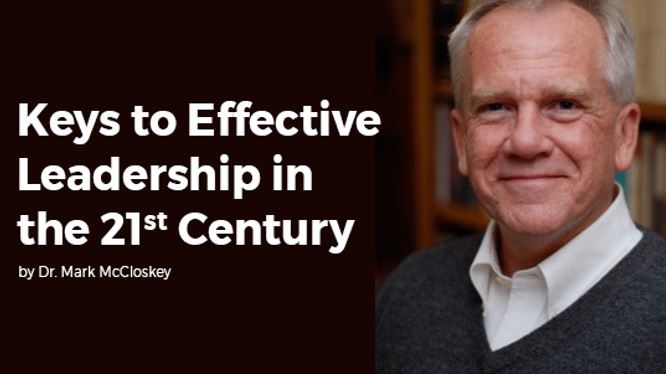
Keys to Effective Leadership in the 21st Century
May 2017Dr. McCloskey gave an inspiring keynote at the March 2nd Marketing & Creative Leaders Summit. His views on leadership in the 21st century are changing how we manage and lead our organizations. This is a must-read article!
The research is in and we have almost two decades of experience to confirm the findings. Leaders armed only with technical–managerial competence are unlikely to succeed over time in the 21st century. Executive search consultant Fernandez-Araoz notes, “In the past few decades, organizations have emphasized ‘competencies’ in hiring and developing talent. Jobs have been decomposed into skills and filled by candidates who have them. But 21st century business is too volatile and complex—and the market for top talent too tight—for that model to work anymore.”
The 21st century demands a new mix of personal assets beyond competence. Researchers as well as ancient thinkers have a name for this suite of assets: virtue.
Our English term virtue is from the Latin virtus meaning “strength.” Virtue is moral strength placed in service of others. Virtue is a concrete moral force, the capacity to do something “good” for others, and to keep doing it over time.
The volatile and complex operating environment of the 21st century places a premium on seven virtues, which fuel effective transformational leadership.
Faith is akin to fidelity. Faithful leaders make a trustworthy commitment to a noble cause beyond self-interest. They infuse the organization with a moral vision, the “why,” which prompts others to collaborate and go the proverbial “extra mile” in service of the organization’s purpose. Without faith, there can be no long-term loyalty, only contractual arrangements, reducing the organization to a temporary mix of individuals with short-term agendas motivated by self-interest.
Hope is an expectation of future good that is mingled with the understanding that good is never guaranteed and that the obstacles are many. Hopeful leaders live in this tension, infusing the organization with the deep conviction that every day is pulsing with potential for progress, and yet progress will not come easily.
The opposite of hope is despair, which saps the energy to continue in the face of difficulty and delay.
Love. The literature suggests a positive association between selfless concern and leadership effectiveness. The demonstration of altruism (love) by leaders is associated with higher levels of trust between leaders and followers, and aids mutual commitment to the organization’s goals. Without love, the organization is likely to confine its moral concern to its own, or those who serve its self-interest.
Wisdom is a combination of foresight, humility and rationality put in service of “the good.” Wisdom shines in the volatility, uncertainty, complexity and ambiguity that mark the 21st century business context. Leaders must stay effective in a variety of situations, none of which is exactly alike, and few of which call for “prepackaged” responses based on formal rules.
Courage is the inner strength to advance in the face of hardship, emotional turmoil, risk to reputation, finances, position, even life itself. Without courage, when adversity strikes, the leader is likely to protect their reputation, secure their privileges and comfort, and seek the course of action that will afford them and the organization the least difficulty—a recipe for failure in a competitive global marketplace.
Justice involves the willingness to take into account the rights, concerns and feelings of others. It is the moral habit of entering into the reality of “the other” and securing for that person what is rightfully due to them. If injustice prevails, if employees are not respected or forced to operate on a playing field tilted in favor of the leader’s self interest, trust, the fuel of collaboration, is eroded.
Temperance is self-restraint, the ability to control (even say “no” to) harmful drives, impulses, and passions. Effective leaders must find the inner strength to overcome all kinds of intoxication—food, sex, alcohol and the most powerful leadership intoxicant, power itself.
SUMMARY
The goal of seeking virtuous leaders is not to find perfect people, but to find people with the greatest potential to provide, despite their acknowledged limitations (humility being a virtuous quality), the kind of leadership an organization needs to flourish in the 21st century.
Mark McCloskey is Lead Faculty in the Master of Arts in Transformational Leadership at Bethel University. His book, The Art of Virtue-Based Transformational Leadership is available at his website, Lead2Transform.com as well as Amazon.com. His textbook, Learning Leadership in a Changing World, is available on Amazon.com.